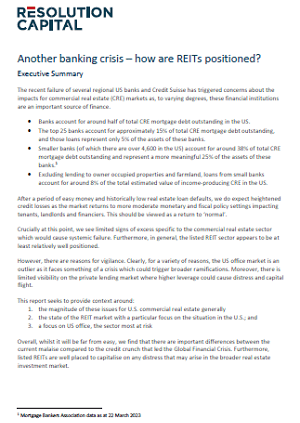Executive summary
The recent failure of several regional US banks and Credit Suisse has triggered concerns about the impacts for commercial real estate (CRE) markets as, to varying degrees, these financial institutions are an important source of finance.
- Banks account for around half of total CRE mortgage debt outstanding in the US.
- The top 25 banks account for approximately 15% of total CRE mortgage debt outstanding, and those loans represent only 5% of the assets of these banks.
- Smaller banks (of which there are over 4,600 in the US) account for around 38% of total CRE mortgage debt outstanding and represent a more meaningful 25% of the assets of these banks.
- Excluding lending to owner occupied properties and farmland, loans from small banks account for around 8% of the total estimated value of income-producing CRE in the US.
After a period of easy money and historically low real estate loan defaults, we do expect heightened credit losses as the market returns to more moderate monetary and fiscal policy settings impacting tenants, landlords and financiers. This should be viewed as a return to ‘normal’.
Crucially at this point, we see limited signs of excess specific to the commercial real estate sector which would cause systemic failure. Furthermore, in general, the listed REIT sector appears to be at least relatively well positioned.
However, there are reasons for vigilance. Clearly, for a variety of reasons, the US office market is an outlier as it faces something of a crisis which could trigger broader ramifications. Moreover, there is limited visibility on the private lending market where higher leverage could cause distress and capital flight.
This report seeks to provide context around:
- the magnitude of these issues for U.S. commercial real estate generally
- the state of the REIT market with a particular focus on the situation in the U.S.; and
- a focus on US office, the sector most at risk
Overall, whilst it will be far from easy, we find that there are important differences between the current malaise compared to the credit crunch that led the Global Financial Crisis. Furthermore, listed REITs are well placed to capitalise on any distress that may arise in the broader real estate investment market.
Download the full paper
